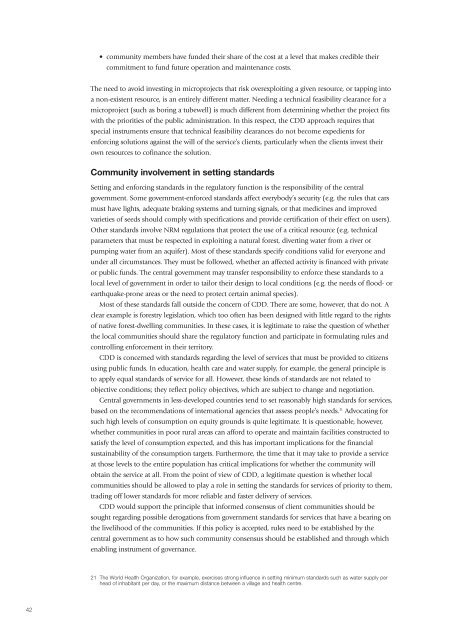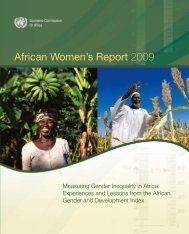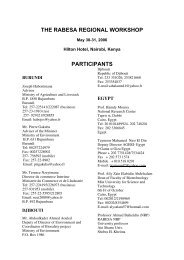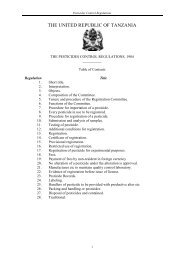Community-driven development decision tools for rural - IFAD
Community-driven development decision tools for rural - IFAD
Community-driven development decision tools for rural - IFAD
- No tags were found...
Create successful ePaper yourself
Turn your PDF publications into a flip-book with our unique Google optimized e-Paper software.
• community members have funded their share of the cost at a level that makes credible theircommitment to fund future operation and maintenance costs.The need to avoid investing in microprojects that risk overexploiting a given resource, or tapping intoa non-existent resource, is an entirely different matter. Needing a technical feasibility clearance <strong>for</strong> amicroproject (such as boring a tubewell) is much different from determining whether the project fitswith the priorities of the public administration. In this respect, the CDD approach requires thatspecial instruments ensure that technical feasibility clearances do not become expedients <strong>for</strong>en<strong>for</strong>cing solutions against the will of the service’s clients, particularly when the clients invest theirown resources to cofinance the solution.<strong>Community</strong> involvement in setting standardsSetting and en<strong>for</strong>cing standards in the regulatory function is the responsibility of the centralgovernment. Some government-en<strong>for</strong>ced standards affect everybody’s security (e.g. the rules that carsmust have lights, adequate braking systems and turning signals, or that medicines and improvedvarieties of seeds should comply with specifications and provide certification of their effect on users).Other standards involve NRM regulations that protect the use of a critical resource (e.g. technicalparameters that must be respected in exploiting a natural <strong>for</strong>est, diverting water from a river orpumping water from an aquifer). Most of these standards specify conditions valid <strong>for</strong> everyone andunder all circumstances. They must be followed, whether an affected activity is financed with privateor public funds. The central government may transfer responsibility to en<strong>for</strong>ce these standards to alocal level of government in order to tailor their design to local conditions (e.g. the needs of flood- orearthquake-prone areas or the need to protect certain animal species).Most of these standards fall outside the concern of CDD. There are some, however, that do not. Aclear example is <strong>for</strong>estry legislation, which too often has been designed with little regard to the rightsof native <strong>for</strong>est-dwelling communities. In these cases, it is legitimate to raise the question of whetherthe local communities should share the regulatory function and participate in <strong>for</strong>mulating rules andcontrolling en<strong>for</strong>cement in their territory.CDD is concerned with standards regarding the level of services that must be provided to citizensusing public funds. In education, health care and water supply, <strong>for</strong> example, the general principle isto apply equal standards of service <strong>for</strong> all. However, these kinds of standards are not related toobjective conditions; they reflect policy objectives, which are subject to change and negotiation.Central governments in less-developed countries tend to set reasonably high standards <strong>for</strong> services,based on the recommendations of international agencies that assess people’s needs. 21 Advocating <strong>for</strong>such high levels of consumption on equity grounds is quite legitimate. It is questionable, however,whether communities in poor <strong>rural</strong> areas can af<strong>for</strong>d to operate and maintain facilities constructed tosatisfy the level of consumption expected, and this has important implications <strong>for</strong> the financialsustainability of the consumption targets. Furthermore, the time that it may take to provide a serviceat those levels to the entire population has critical implications <strong>for</strong> whether the community willobtain the service at all. From the point of view of CDD, a legitimate question is whether localcommunities should be allowed to play a role in setting the standards <strong>for</strong> services of priority to them,trading off lower standards <strong>for</strong> more reliable and faster delivery of services.CDD would support the principle that in<strong>for</strong>med consensus of client communities should besought regarding possible derogations from government standards <strong>for</strong> services that have a bearing onthe livelihood of the communities. If this policy is accepted, rules need to be established by thecentral government as to how such community consensus should be established and through whichenabling instrument of governance.21 The World Health Organization, <strong>for</strong> example, exercises strong influence in setting minimum standards such as water supply perhead of inhabitant per day, or the maximum distance between a village and health centre.42
















